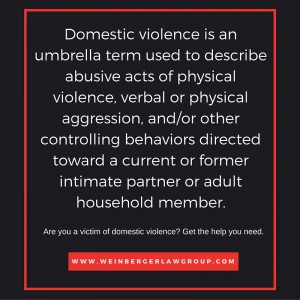Domestic Violence Protection: How The Courts Help Victims
 Domestic violence, also known as intimate partner violence, remains a dire issue in New Jersey. According to statistics compiled by the New Jersey State Police, there are approximately 70,000 reports of domestic violence per year statewide, 42% of which involved physical assault. Domestic violence victims in New Jersey can be women or men. As stated by Assemblywoman Celeste Riley, “Domestic violence doesn’t know a sex, it doesn’t know an age,” she said. “If you are abused, you are a victim.”
Domestic violence, also known as intimate partner violence, remains a dire issue in New Jersey. According to statistics compiled by the New Jersey State Police, there are approximately 70,000 reports of domestic violence per year statewide, 42% of which involved physical assault. Domestic violence victims in New Jersey can be women or men. As stated by Assemblywoman Celeste Riley, “Domestic violence doesn’t know a sex, it doesn’t know an age,” she said. “If you are abused, you are a victim.”
If you are a victim, there are legal remedies that can protect you; specifically in the New Jersey family courts. The family court has the authority to issue both temporary and final restraining orders, and many times, these proceedings go hand in hand with any criminal case that may be ongoing. Here are some tips to help you navigate the court system…
1. It goes without saying: if you or someone you love is in a violent situation, get help. If there is an emergency, call 911. The New Jersey Statewide Domestic Violence Hotline provides a 24-hour, seven-day-a-week confidential hotline for domestic violence victims and others seeking crisis intervention, information and/or referral services at 1 (800) 572-SAFE (7233).
2. Investigate temporary restraining orders: A temporary restraining order can be obtained in your local family court house during normal business hours, or after hours through your local police station or municipal court. In order to obtain a temporary restraining order, you must “prove” that you were recently abused by someone whom the domestic violence statute covers, such as a spouse or a boyfriend/girlfriend or a parent or even a roommate. The family court will not issue restraining orders if your abuser is a stranger or not someone with whom you are in a close relationship. Domestic violence is not always physical. It can be threats, stalking or emotional abuse.
3. Prepare for the final restraining order hearing: After you receive the temporary restraining order, you will get a court date for the final restraining order hearing. This hearing should occur within ten days of your getting the temporary restraining order. During this time, your abuser is not permitted to contact you at all. The final restraining order hearing is before a family court judge. You will have to prove to the judge during the hearing that you were the victim of a recent act of domestic violence and that there is a continued need for protection that the final restraining order would give you. You are able to bring up past incidents of domestic violence even if they were not reported, once you prove to the judge that the most recent incident did indeed occur.
4. Enforcing protection: If the judge agrees with you, you will receive a final restraining order against your abuser. This order is permanent and it prohibits any further contact between you and the abuser, including third party contact, text message, phone calls or letters. If the order is violated and you are contacted, call the police immediately, as your abuser is subject to immediate arrest.
5. Speak to a family law attorney: The process of obtaining the final restraining order can be complicated. The hearing is formal and you have to abide by the rules of court and the rules of evidence. You can be cross examined by your abuser or his attorney, which can be extremely stressful. It is strongly recommended that you seek the advice of an experienced attorneys who has a proven track record helping victims of domestic violence.
If you are ready to discuss a restraining order as an avenue to getting safe, we can help. To speak with one our compassionate and experienced family law attorneys, please contact us today to set up your free and confidential consultation.
Read More:
Domestic Abuse: Signs, Signals and Help




